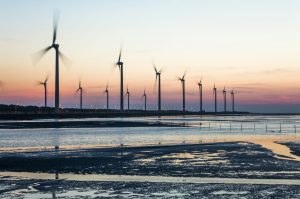On August 7, U.S. President Joe Biden signed into law the first round of agreements in the United States-Taiwan Initiative on 21st Century Trade. This act sends a strong signal to Taipei that the Taiwan-U.S. economic relationship continues to be a “win-win” for both countries. In addition to deepening economic relations, the United States and Taiwan continue a robust defense partnership. Recently, the U.S. announced a $345 million military aid package to Taiwan that will draw directly from American weapons stockpiles to better prepare the island’s defenses against a plausible Chinese invasion.
While trade and defense are the dominant pillars of the Taiwan-U.S. relationship, a key component of Taiwan’s prosperity and security remains out of the spotlight. Namely, Taiwan has had difficulties securing domestic sources and supplies of energy. Therefore, in order to maintain Taiwan’s strength as an economic powerhouse and key U.S. partner in its strategic competition with China, energy cooperation that ensures an affordable and reliable supply of energy should become a third pillar of Taiwan-U.S. relations.
In an effort to combat climate change, the Tsai Ing-wen administration has set a goal to change the country’s energy mix to “20-30-50” by 2025, in which 20 percent of Taiwan’s power would be generated by renewables, 30 percent by coal, and 50 percent from natural gas. Taiwan is far from meeting these goals, however; the country’s current energy supply is composed of around 2.6 percent renewables, 4.9 percent nuclear, 19.0 percent natural gas, 29.5 percent coal, and 44.1 percent crude oil. As the country phases out nuclear energy, it is evident that Taiwan’s transition to renewable energy may fall short.
In addition to this difficult transition to renewable energy, Taiwan imports nearly 98 percent of its energy, making it vulnerable to disruptions in the supply chain, soaring costs in the energy market, and volatile geopolitical threats.
Criticism of Taiwan’s energy policies have come on two fronts. The first is that Taiwan does not even have an energy policy. In early August, American economist Jeffrey Sachs criticized Taiwan for having “no plan at all” other than the “20-30-50” policy, which Sachs dismissed as little more than a “statement.” Sachs also criticized Taiwan’s trajectory toward an 80 percent fossil fuel system, which, given Taiwan’s goal of decarbonization, makes little sense.
The other criticism is that Taiwan’s energy transition is well behind schedule. Last June, the American Chamber of Commerce in Taiwan (AmCham) expressed concern over a number of things, including the lack of a clear plan for renewable energy transition, unwarranted barriers for foreign investors, and the shortfall of wind energy (currently at 2 gigawatts despite a goal of 6.7 GW by 2025).
As the first step to promoting Taiwan’s renewable energy sources, Taiwan should be invited to join the Clean EDGE Asia Initiative. EDGE (Enhancing Development and Growth through Energy) is a U.S. State Department-led initiative that pairs Asian countries transitioning to renewable energy sources with private sector resources and investments. Countries such as India, Japan, Singapore, and the Philippines are all members of this initiative; Taiwan’s inclusion would only strengthen the prospects of this initiative’s success. As a platform for dialogue and information sharing, Taiwan’s participation in EDGE will give it a better opportunity to work with investment companies like Blackstone, the world’s largest alternative asset manager, which in June announced an investment of $1 billion into Invenergy Renewables. Blackstone also has its eyes set on “under-invested” Asian renewable energy markets.
While the lack of official diplomatic relations between the United States and Taiwan may represent a challenge to Taiwan’s inclusion in EDGE, one possible solution would be to work through the auspices of the American Institute in Taiwan (AIT), the de facto embassy in Taiwan, and the Taipei Economic and Cultural Representative Office (TECRO), Taiwan’s de facto embassy in the United States. This is already the model for Taiwan-U.S. bilateral agreements and other platforms such as the Global Cooperation and Training Framework (GCTF), which promotes Taiwan’s international space and already focuses on topics such as technology sharing and energy cooperation. However, a more focused platform on energy cooperation gives Taiwan a better chance of meeting its energy needs.
Additionally, the United States can help promote Taiwan’s energy security through an agreement between the U.S. Department of Energy’s Office of Cybersecurity, Energy Security, and Emergency Response and Taiwan’s Ministry of Economic Affairs’ Bureau of Energy that prioritizes research and development and data sharing to utilize the latest technology in storage capacity and in carbon capture and sequestration methods.
Finally, as the second round of talks for the Taiwan-U.S. 21st Century Trade Initiative begins, policymakers should prioritize energy cooperation between the United States and Taiwan. Congressional oversight of the Taiwan-U.S. relationship vis-à-vis energy security will help ensure that the power in Taiwan stays on.
Taiwan is no exception to the long list of countries facing difficulties in their transition to green energy. While Taiwan remains officially off the international stage, the United States should help Taiwan achieve its domestic energy needs by addressing energy cooperation head-on with similar resources and platforms as seen in the economic and security relationships. After all, what is the future of Taiwan-U.S. relations if Taiwan fails to meet its energy goals?

































